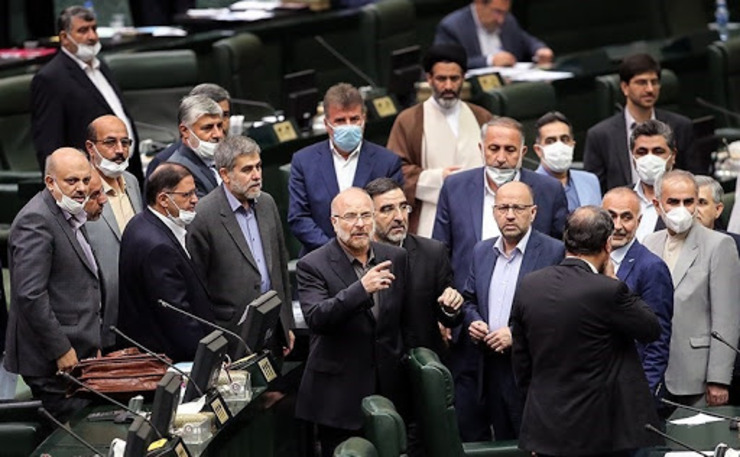EDITORIAL: The Regime’s Infighting, Khamenei’s Weakness, and Fear of Overthrow

Written by
Staff Writer
Iran’s regime Parliament’ infighting
The Iranian regime’s increasing infighting within the last two weeks and the remarks of the mullahs’ supreme leader Ali Khamenei about the infightings show the regime’s critical and fragile situation.
Over the past two weeks, members of the regime’s parliament have sought to impeach the mullahs’ president Hassan Rouhani in unprecedented infighting. Some lawmakers have gone so far as to seek pressure for impeachment through some mullahs in Qom in addition to the parliament. All the while Khamenei had already warned the members of his faction to not seek Rouhani’s impeachment because he knew very well that this would spark another uprising.
The regime’s infighting reached a new height when Mojtaba Zolnouri, head of parliament’s National Security and Foreign Policy Commission demanded Rouhani’s execution. Thus, after eight months of absence and quarantine, Khamenei was forced to come to the scene and declare Rouhani’s impeachment as being against the regime’s interests.
The fact that even the members of Khamenei’s faction ignored his previous warnings and sought Rouhani’s impeachment is a sign of Khamenei’s weakness. Moreover, the regime’s critical situation is more important, and it has terrified all the regime’s officials. The regime’s mullahs are terrified of the crisis of overthrow and the explosive state of society.
In other words, the regime’s infightings and struggles, despite their severity, are not simply the result of internal conflicts between the rival factions. The problem is not even the issue of ousting Rouhani or his faction; rather, these increased infightings are signs of the regime’s deadlock and the crisis of overthrow.
The regime’s infightings reflect its miserable economic situation, the spread of corruption in the entire government and regime-affiliated organizations, and an increase in general dissatisfaction. They also reflect the regime’s failure to stop the spread of the Mujahedin-e Khalq (MEK) Resistance Units and their activities, despite imposing severe oppression, and most importantly the regime’s fear of an uprising. The state-run media keep warning about this looming uprising.
One regime official, in a recent round of infighting, pleaded with others, saying: Why don’t you understand, we are all on the same boat.
This situation is reminiscent of the last days of the Shah, when Abbas Hoveida, the Shah’s prime minister for 13 years, was discharged and later arrested. The Iranian regime’s current infighting portrays an explosive society.
The crisis of poverty, for which the Iranian people rightly blame the regime, and the regime’s secrecy and lack of a proper policy to deal with the coronavirus, which has so far killed more than 136,000 people, has put the regime in its current deadlock.
In addition, Iranian society is one that has gone through three major uprisings in the last three years, with the central slogans being ‘Death to Khamenei’ and ‘Death to the Principle of Velayat-e Faqih (Supreme Clerical Rule).’ The combination of these factors has turned Iran’s society into a powder keg and put the regime in a deadlock. The reflection of this explosive situation within the regime turns into endless infightings.

